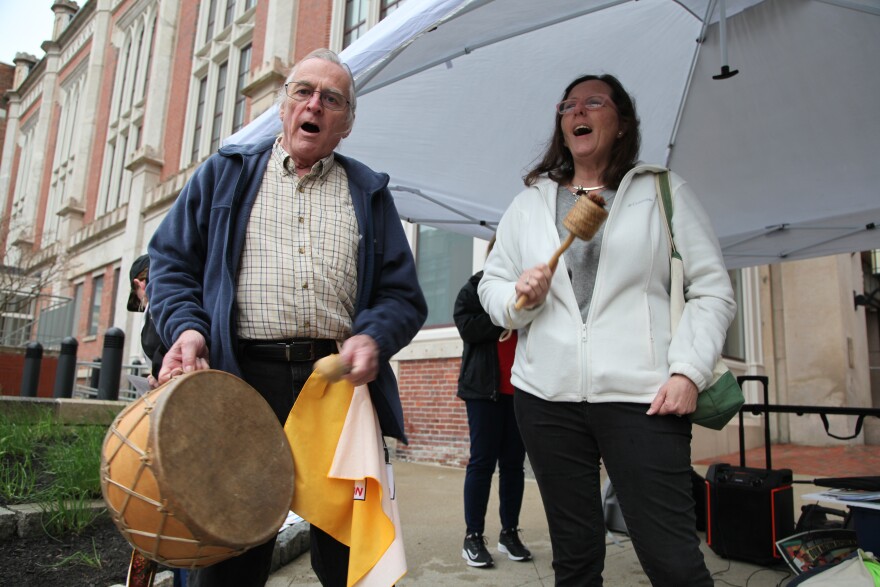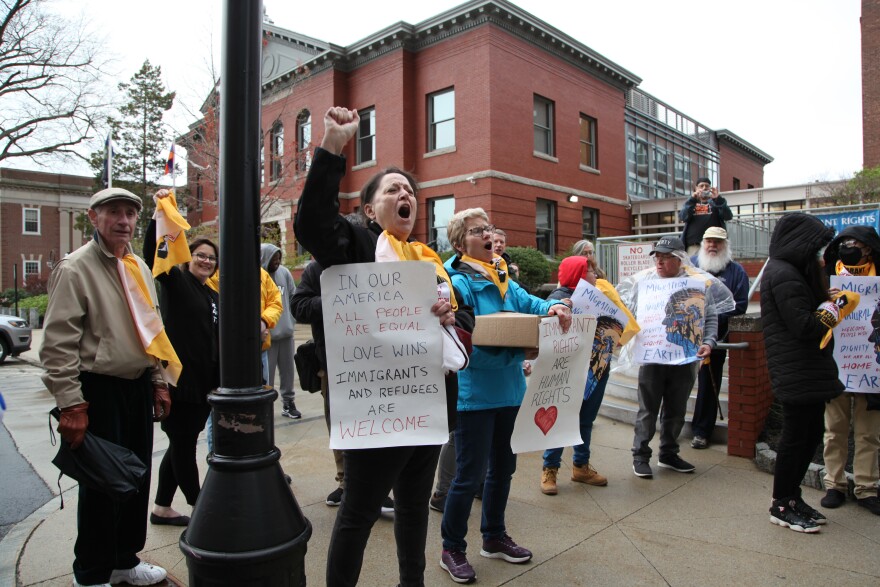Editor’s Note: Since the initial publication of this story, NHPR has reported that citizens of a federally recognized Abenaki First Nation based in Canada say there is no evidence many members and leaders of two New Hampshire groups have Abenaki ancestry. An NHPR review of genealogies and other records also failed to support local leaders’ claims of Abenaki ancestry.
Manchester was among several major U.S. cities on Monday with rallies commemorating International Workers Day.
The event was organized by the New Hampshire Alliance for Immigrants and Refugees.
Armed with a microphone, the group’s director, Eva Castillo, encouraged the crowd of about 50 people in front of City Hall to shout and sing for workers’ dignity and immigrants’ rights.
Organizers handed out yellow scarves with the phrase “immigrant justice now” that each wore on the cold and rainy afternoon.
The rally began with an Abenaki land acknowledgment by Paul and Denise Pouliot.

After two years of the pandemic, this year’s march attracted a larger crowd, drawing people from various cities around the state.
Advocates and faith leaders gave speeches, saying workers suffer from a lack of affordable housing, discrimination, and health hazards in New Hampshire.
Brian Mitchell, director of the New Hampshire Coalition of Occupational Safety and Health, said he has lived in Manchester for a long time. While immigrants’ countries of origin have changed over the years, the battles remain the same he says.
“I am encouraged by the people here today to keep fighting,” Mitchell said.

Some in the crowd supported a municipal resolution in favor of a $15 minimum wage for Manchester city employees.
Others argued the minimum wage should be higher than that. Reverend Gail Kinney is the Justice Minister of the Meridien Congregational Church. “We are part of a moral statement; paying full-time workers a wage that will keep them living in poverty is immoral,” she said.

Some speakers brought up Title 42, which the Trump administration invoked in March 2020. The World War II-era public health law allows the government the “power to prohibit, in whole or in part, the introduction of persons and property” to prevent a communicable disease from spreading. Since then, migrants have been quickly expelled to Mexico or other countries, including those seeking asylum at the border.
The CDC announced its plans to end Title 42 on May 23. But Republicans and some Democrats, including Senator Maggie Hassan and Representative Chris Pappas, have said they support keeping Title 42 in place.

State representative María Perez, an immigrant who moved here 35 years ago from El Salvador, asked attendees of the rally to think thoroughly about who they cast their vote for in the next elections.
Perez referred to the statements Sen. Hassan and Rep. Pappas gave in support of preserving Title 42.
“How many extra votes do they think they will get from this,” she said.

Reverend John Gregory Davis voiced his concern about the fate of thousands of immigrant workers at the border, with Title 42 in place. “Certainly, Hassan and Pappas need to hear that their position is unacceptable and we will not support them betraying our immigrants. They need to hear that,” he said.
Demonstrators also focused on the right to form unions, asking local and state officials to create municipal and state labor laws that protect workers' rights to organize and bargain collectively.

Ian Scott, a sophomore at Dartmouth College and one of the leaders of the union Student Workers Collective talked about his experience of what he said was fighting the system for international and BIPOC students.
“If it wasn't for what we are doing right now the conditions would be worse. We will continue to fight for full contracts,” Scott said.
Long applause was heard when organizers called for more support for immigrant workers, who have been disproportionately affected by the ongoing pandemic.
“This kind of demonstration should happen every day until we all have the right to acquire employment and live in dignity,” said Caroline Morse-Finn, a volunteer for Freedom For Immigrants.

Ariel Duque, who’s originally from Colombia, said he went to the march because he knows many immigrants in New Hampshire who stay at home, are worried about what might happen if they exercise their rights. “I am grateful for being in this land of opportunities, but many people are being treated unfairly,” he said.









